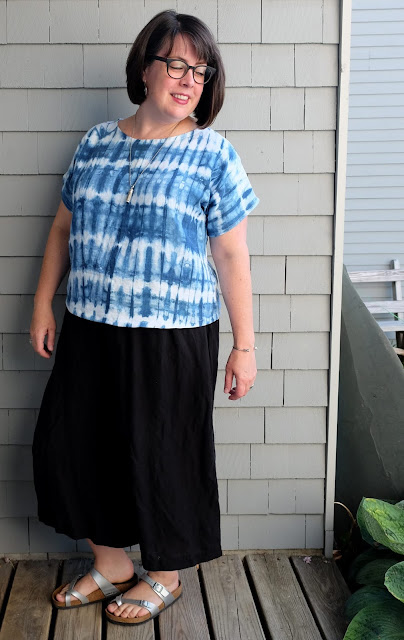I hope this photo adequately expresses how excited I am about this top!!
I dyed it AND sewed it AND the fabric is a remnant from my stash. Triple threat. Achievement unlocked. So. Satisfying.
Over the past couple of years, I've done indigo dying using shibori folding techniques a couple times now at workshops, but the workshops dyed small pieces of fabric, like tea towels. Fun, but I have been dying (har har) to try those techniques on larger pieces of fabric I could use for garment making.
My sister was coming to visit for a long weekend... we had lots of activities planned, from a concert to outdoorsy stuff to some breweries, but I know she also loves a good craft project. So I decided to mix up a batch of indigo dye and have another go at it!
I pulled some stash fabrics (cotton lawn, linen) and bought a couple others (cotton gauze, rayon/lycra), as well as a few RTW t-shirts, and we made it work! We used one of these indigo dye kits (although I ended up finding it locally at AC Moore craft store), and a combination of instructions from the workshops I took, the kit's instructions, and a couple of websites (Closet Case Patterns and Honestly WTF) for the guidance on folding techniques.
It turns out that applying the shibori techniques to larger pieces of fabric is a bit more finicky than with the tea towels, particularly the more geometric designs... but it still worked smashingly!
You can check out my Instagram stories for all of the shibori before-and-after shots, but here's what worked for this particular shirt: I used a small (a little bit less than a yard) of 100% linen left over from my Kalle and Classic shirts.
I folded the piece selvage to selvage, right sides out, then basically finger pleated it from the fold to the selvages, trying to keep it somewhat uniform without getting too finicky about it. Then I wrapped thick rubber bands, evenly spaced down the length of the fabric, to secure those pleats and create the thick white stripes where the dye couldn't reach.
I dyed the rubber-banded bundle in the vat of indigo dye for about 10 minutes, took it out to oxidize for a bit, then popped it back in for a second dye session of another 10 minutes, give or take (we got a little bit loose with our timing).
After pulling it out of the dye bath the second time, we let it dry overnight with the rubber bands still in place. Then we unwrapped the rubber bands and gave the fabric a big rinse outside with the hose and a bucket. Then we threw all of the dyed pieces together in the laundry and washed and dried them as usual.
I absolutely love it! So happy with how the design turned out on my linen. It's stripey and geometric, organic and delightfully imprecise, without being too tie-dye-y or hippie-ish (a look that people seem to fall into easily here in Vermont, aka Phishlandia). The linen substrate definitely elevates it, and soaked up the dye really well. The whole look is just so summery!
So, the shirt: this is the 100 Acts of Sewing Shirt No. 1 pattern. I received the pattern for free from Imagine Gnats, who is now carrying this line. You can check out my pattern review on the Imagine Gnats blog this week, but sufficed to say, I made it twice in one night and have worn it three times since, so I am clearly feeling it!
This pattern has a bit of a cult following, and for good reason. So simple, but so elegant! I figured the clean lines would be perfect to show off my busy, hand-dyed fabric.
This is a size large Shirt No. 1, same as the version I sewed for Imagine Gnats, and the fit is perfectly slouchy, but not oversized. I trimmed the front neck down by about 1.5" in the center front (you can choose your own neck depth with this pattern).
So satisfying to both dye and sew this shirt (and use up remnants in the stash!)! I am totally enamored and can't wait to sew up all of the other pieces of fabric I dyed.
Have you done any shibori or indigo dyeing? Any hot tips or particularly successful techniques?













